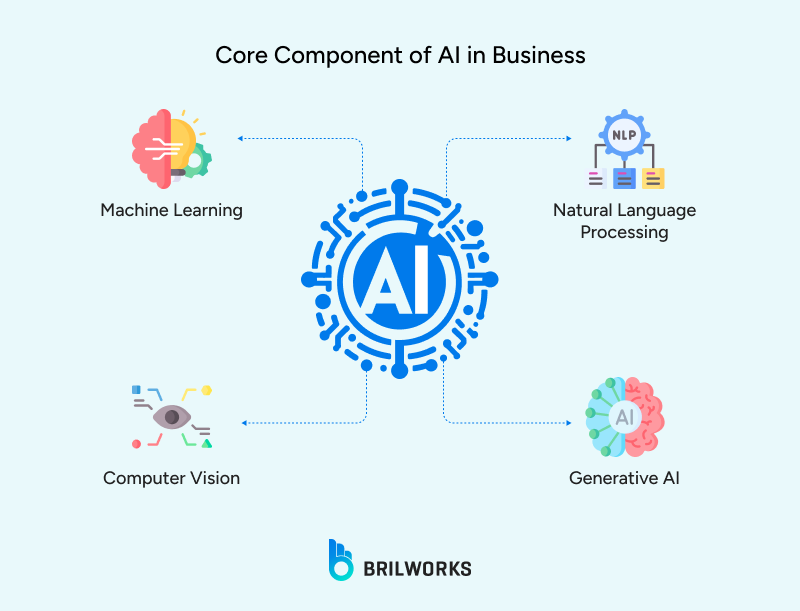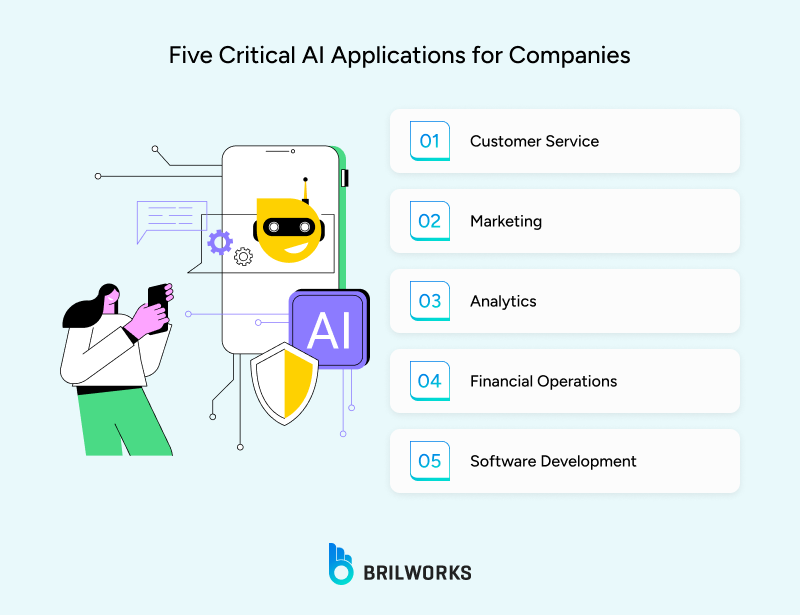COOPERATION MODEL
ARTIFICIAL INTELLIGENCE
PRODUCT ENGINEERING
DevOps & Cloud
LOW-CODE/NO-CODE DEVELOPMENT
INDUSTRY
FRONTEND DEVELOPMENT
CLOUD DEVELOPMENT
MOBILE APP DEVELOPMENT
LOW CODE/ NO CODE DEVELOPMENT
EMERGING TECHNOLOGIES








Just like how the internet revolutionized business operations, artificial intelligence (AI) is set to create a similar transformation. Many industries are already feeling its effects, with AI taking over tasks in areas such as content creation, customer service, and data entry.
For businesses considering AI adoption, it’s important to understand where this technology can bring the most value. In this article, we will explore five key areas where AI is making a significant impact in business operations and how industry leaders can start using it to improve their operations.
In a business context, Artificial Intelligence (AI) refers to the use of intelligent systems using artificial intelligence to perform a variety of tasks that typically require human intelligence. These systems can analyze a mountain of data, learn from the patterns, make predictions, and automate processes to drive operational efficiency and strategic decision-making.
AI adoption is growing fast. In 2025, 78% of companies worldwide will use AI, and 71% are already using generative AI in at least one area. This shift is changing how businesses grow and compete.
At its core, AI in companies relies on a few key technologies:

Machine Learning (ML): Algorithms that enable systems to learn from data and improve their performance over time without being explicitly programmed. This is the engine behind predictive analytics and personalization.
Natural Language Processing (NLP): This technology helps computers understand and use human language. It's what powers advanced chatbots and tools that analyze customer opinions.
Computer Vision: AI that enables machines to interpret and process visual information from the world, used in everything from manufacturing quality control to retail inventory management.
Generative AI: A newer class of AI models that can create new content, such as text, images, code, and complex data, based on the patterns it has learned.
AI brings real, measurable benefits to businesses. Although early projects can be tough to measure, companies that use AI effectively see strong results. For instance, product teams using generative AI have achieved a median ROI of 55%.
Here are the primary benefits of artificial intelligence in business:
Operational Efficiency: AI automates routine, high-volume tasks like data entry, customer support triage, and financial reconciliation. This frees up human employees to focus on strategic, high-value work and reduces the risk of human error.
Cost Reduction: By streamlining processes, optimizing logistics, and automating support, artificial intelligence benefits businesses by lowering operational costs. AI-powered predictive maintenance, for instance, reduces costly equipment downtime and emergency repairs.
Enhanced Decision-Making: AI algorithms can analyze complex datasets in real-time, providing deep insights that are impossible for humans to uncover. This leads to more accurate forecasting, better-informed strategies, and faster, data-driven decisions.
Competitive Advantage: Companies using AI for business can innovate faster, personalize customer experiences at scale, and optimize their supply chains more effectively than competitors who rely on traditional methods.
Innovation Acceleration: AI enables the creation of entirely new products, services, and business models. From AI-driven drug discovery in healthcare to hyper-personalized financial advice, AI is a catalyst for breakthrough innovation.
To see the difference AI makes, compare business operations before and after its integration.
|
Time Savings |
Manual, slow, and reactive processes |
Automated, real-time, and predictive workflows |
|
Cost Reduction |
High labor costs for repetitive tasks |
Lower operational expenses through automation |
|
Accuracy Improvement |
Prone to human error and inconsistencies |
High precision, standardized, and fewer errors |
|
Decision-Making Speed |
Delayed, based on historical reports |
Instant, data-driven insights for in-the-moment decisions |
While the uses of AI in business are vast, five applications stand out for their immediate and high-impact results. These are the areas where AI for companies is proving its value every day.

AI-powered chatbots and virtual assistants have revolutionized customer support. Using Natural Language Processing, these tools can understand customer intent, handle inquiries 24/7, and resolve common issues without human intervention.
Companies using AI in customer service report that major routine customer questions can be resolved without a human agent. This leads to staggering improvements in efficiency, with AI cutting issue resolution time by 76% (from an average of 18.6 hours to 3.2 hours) and reducing average customer handling time by 40%.
Generic marketing is not working now. AI used in business marketing, looking over a vast amount of customer data (browsing history, past purchases, demographics), helping marketers create hyper-personalized campaigns. Recommendation engines, like those used by Amazon and Netflix, are a prime example.
This personalized approach directly impacts the bottom line. AI-powered recommendation engines are responsible for up to 35% of all e-commerce revenue. Furthermore, personalized emails deliver 6 times higher transaction rates, and businesses that successfully implement AI personalization see conversion rates increase by up to 30%.
In finance, AI is rapidly growing for automation and security-related operations. Popular use cases of AI in finance include real-time fraud detection and financial data analysis. It can monitor millions of transactions simultaneously, flagging unusual activities far faster than any human team.
AI not only detects fraud but also reduces false positives, which are legitimate transactions that get declined by mistake. In fact, 70% of businesses say false positives cost them more than real fraud. AI helps cut these errors. By 2027, global savings from AI in fraud detection could reach $10.4 billion.
AI is especially useful for managing supply chains. It helps optimize inventory by studying demand patterns, improves logistics with smarter route planning, and supports predictive maintenance for equipment.
Rather than waiting for machines to break, AI uses sensor data to predict problems early so maintenance can be scheduled in advance.
AI-driven demand forecasting can reduce errors by 20-50%, leading to a 20-35% reduction in inventory costs. In manufacturing, AI-powered predictive maintenance has been shown to reduce equipment breakdowns by up to 70% and cut overall maintenance costs by 25%.
Beyond these general applications, artificial intelligence business applications are being tailored to specific sectors:
Healthcare: AI-powered diagnostic tools analyze medical images (like X-rays and MRIs) with superhuman accuracy. AI also personalizes treatment plans and automates administrative workflows.
Retail: In addition to personalization, AI optimizes inventory, powers "visual search" (letting you search with a picture), and analyzes in-store traffic to improve layouts.
Manufacturing: AI-driven quality control is a game-changer. Computer vision systems can inspect products on an assembly line with incredible speed and precision, reducing defect rates by 30% and cutting inspection times by over 80%.
Financial Services: Beyond fraud, AI is used for algorithmic trading, personalized financial advice, and automated risk assessment for loans and insurance.
Transportation: AI optimizes delivery routes for logistics giants, powers the development of autonomous vehicles, and manages fleet maintenance schedules.
For any company using AI, a strategic approach is to identify high-impact use cases before integrating AI solutions. Here’s the path you can take to integrate AI in business without messing up.

AI is fueled by data. Before you can build, you must audit. Identify inefficiencies and assess your data readiness. Before identifying use cases, ask yourself these questions.
Do you have the data you need?
Is your data clean and reliable?
Is your data siloed in different systems, or can it be easily integrated?
Does your data handling meet privacy regulations like GDPR or CCPA?
This is a critical step, as 43% of companies cite data quality and readiness as the single biggest barrier to AI success.
Don't try to boil the ocean. Start by prioritizing AI uses in business that offer the best balance of high business value and low implementation complexity.
Potential ROI: How much time/money will this save or generate?
Complexity: Do we have the data and technical skills to do this?
Feasibility: Can this be done in a reasonable timeframe?
Start with a project that can deliver a "quick win" to build momentum and get stakeholder buy-in.
You must decide whether to "build" a custom AI solution from scratch or "buy" an existing platform from a vendor.
Build offers full customization but requires a dedicated team of data scientists and engineers (high cost and time). Buy is faster to deploy and more cost-effective.
Start small. A pilot project tests your assumptions on a limited scale. This allows you to validate the solution and measure its impact before a full-scale rollout. Involve the end-users (e.g., customer service agents) in this process. Their feedback is crucial for adoption.
Once your pilot is successful, you can move to full implementation. AI systems need ongoing monitoring, regular updates with new data, and adjustments to keep performing well. Despite the clear benefits of AI for business, many leaders hesitate due to valid concerns.
Here’s how to address them:
Data Privacy and Security: This is non-negotiable. Implement strict data governance policies, ensure all data is encrypted, and work with legal experts to ensure full compliance with frameworks like GDPR.
Cost and ROI Uncertainty: Start with the high-impact, low-complexity use cases identified in your pilot. Track clear metrics from day one to build a strong business case and demonstrate ROI before seeking larger investments.
Skills and Talent Gaps: The 35% of companies that cite a "skills gap" as a barrier can solve it in two ways:
Upskill: Invest in training your current employees.
Partner: Work with external AI consultants or "buy" solutions that don't require deep technical expertise.
Integration with Legacy Systems: Modern AI platforms are built to integrate. Use APIs (Application Programming Interfaces) and middleware to connect your new AI tools with your existing software stack.
Employee Resistance: Be transparent. Communicate clearly that the goal of AI is to augment employees, not replace them. Involve staff in the process and show them how AI can remove the most tedious parts of their jobs, allowing them to focus on more creative and engaging work.
AI is now a central part of running a modern, competitive business. The future will be shaped by generative AI, autonomous systems, and advanced analytics, opening up even more opportunities.
The global artificial intelligence market, valued at over $370 billion in 2025, is projected to surge to $2.4 trillion by 2032. Companies that delay adoption risk being left behind in an increasingly efficient and intelligent marketplace.
For businesses ready to transform operations and drive growth through AI, the first step is developing a tailored implementation strategy.
Measure AI ROI by tracking specific metrics tied to your goals. This can include time saved on automated tasks, error reduction rates, increased sales from personalization, higher customer satisfaction scores (NPS), and reduced operational costs. Compare these quantifiable benefits against the total cost of implementation (software, training, etc.).
Businesses implementing AI must navigate data privacy laws (like GDPR in Europe or CCPA in California), which govern how customer data is collected, stored, and used. Ethically, companies must ensure algorithmic fairness (avoiding bias in AI decisions), maintain transparency in how AI is used, and establish clear accountability frameworks for automated systems.
No, you don't need to be a data scientist to start. Many modern AI for business solutions are "low-code" or "no-code," designed with user-friendly interfaces. For more complex projects, partnering with experienced AI consultants or vendors can accelerate your implementation and help you maximize business value without needing a large in-house technical teama .
Get In Touch
Contact us for your software development requirements
Get In Touch
Contact us for your software development requirements